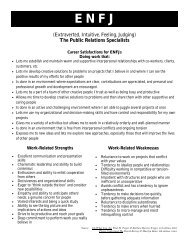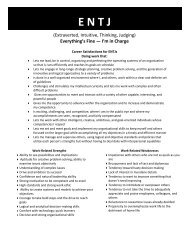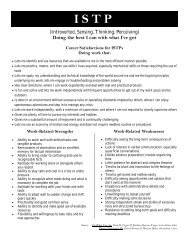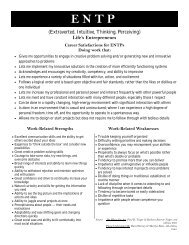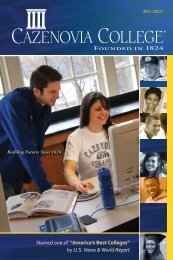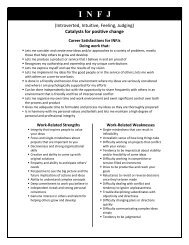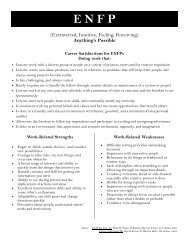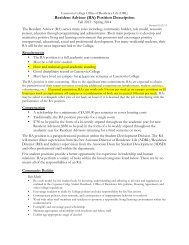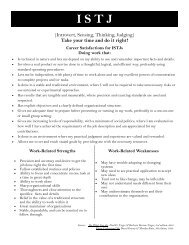of
2013-14 Academic Catalog - Cazenovia College
2013-14 Academic Catalog - Cazenovia College
- No tags were found...
Create successful ePaper yourself
Turn your PDF publications into a flip-book with our unique Google optimized e-Paper software.
HS 361 Therapeutic Recreation<br />
3 credits (CS)<br />
This course will examine how therapeutic recreation helps to<br />
improve or maintain physical, mental, emotional, and social<br />
functioning <strong>of</strong> children or adults with disabilities, as well as<br />
the elderly. Students will explore how to assess and evaluate<br />
people who would benefit from therapeutic recreation. The<br />
course will present different theories and techniques<br />
supporting therapeutic recreation. (Offered annually)<br />
Prerequisite: HS 240 Introduction to Counseling, or<br />
permission <strong>of</strong> the program director<br />
HS 382 Social Services for Children and Youth<br />
Internship III<br />
6 credits (CS)<br />
Students participate in programs that serve children and<br />
youth and their families. Examples <strong>of</strong> sites include group<br />
homes for runaways, classrooms for students who are<br />
learning disabled, residential facilities for troubled youth,<br />
alternate school programs for pregnant teens, day care for<br />
abused children, and recreational programs for high-risk<br />
adolescents. Students’ previous experiences and their<br />
academic preparation determine internship placement. The<br />
internship allows students to use a variety <strong>of</strong> interventions,<br />
such as case management, group work, family work, and<br />
community planning to serve the needs <strong>of</strong> the clients and<br />
human service systems. A weekly seminar that integrates<br />
academic concepts with pr<strong>of</strong>essional application and practice<br />
accompanies the internship. (Offered annually) Prerequisites:<br />
A minimum grade <strong>of</strong> "C" must be earned in each 100/200<br />
level Human Services course. Either HS Internship I or II,<br />
and HS 240 Introduction to Counseling, and one <strong>of</strong> the<br />
following: HS 341 Counseling Theories, HS 343 Intervention<br />
Strategies, HS 345 Counseling Families in Crisis, or HS 331<br />
Group Dynamics. The permission <strong>of</strong> the program director is<br />
also required for the internship experience.<br />
HS 383 Counseling and Mental Health Internship III<br />
6 credits (CS)<br />
Students work as interns in mental health sites such as:<br />
outpatient day treatment centers, community mental health<br />
agencies, residences for homeless people, programs for<br />
people with developmental disabilities, rehabilitation centers<br />
for substance abuse, inpatient psychiatric units, and<br />
community residences for people with mental illness.<br />
Students’ previous experiences and their academic<br />
preparation determine internship placement. The internship<br />
allows students to use a variety <strong>of</strong> interventions, such as case<br />
management, group work, family work, and community<br />
planning to serve the needs <strong>of</strong> the clients and human service<br />
systems. A weekly seminar that integrates academic concepts<br />
with pr<strong>of</strong>essional application and practice accompanies the<br />
internship. (Offered annually)<br />
Prerequisites: A minimum grade <strong>of</strong> "C" must be earned in<br />
each 100/200 level Human Services course. Either HS<br />
Internship I or II, and HS 240 Introduction to Counseling,<br />
and one <strong>of</strong> the following: HS 341 Counseling Theories, HS<br />
343 Intervention Strategies, HS 345 Counseling Families in<br />
Crisis, or HS 331 Group Dynamics. The permission <strong>of</strong> the<br />
program director is also required for the internship<br />
experience.<br />
HS 384 Alcohol and Substance Abuse Internship III<br />
6 Credits (CS)<br />
Students work as interns in alcohol and substance abuse<br />
settings such as inpatient and outpatient rehabilitation<br />
programs, community residences, state and county programs<br />
and counseling centers. Students’ previous experience and<br />
their academic preparation determine internship placement.<br />
The internship allows students to use a variety <strong>of</strong><br />
interventions such as individual and group therapy, family<br />
work, and community planning to meet the needs <strong>of</strong> the<br />
clients. A weekly seminar that integrates academic concepts<br />
with pr<strong>of</strong>essional application and practice accompanies the<br />
internship. (Offered annually)<br />
Prerequisites: A minimum grade <strong>of</strong> "C" must be earned in<br />
each 100/200 level Human Services course. Either HS<br />
Internship I or II and HS 240 Introduction to Counseling<br />
and HS 344 Intervention Strategies for Alcohol and<br />
Substance Abuse. The permission <strong>of</strong> the program director is<br />
also required for the internship experience.<br />
HS 431 Rehabilitation Services<br />
3 credits (CS)<br />
This course examines specific techniques in the rehabilitation<br />
process. Emphasis is placed on contemporary modalities <strong>of</strong><br />
rehabilitation as they relate to community mental health and<br />
alcohol and substance abuse programs. Assessment,<br />
treatment, and prevention techniques will be examined.<br />
Students will be able to identify how people with mental<br />
disabilities and alcohol and substance abuse issues are<br />
restored to their fullest psychological, social, and vocational<br />
capabilities. (Offered alternate years) Prerequisite: HS 240<br />
Introduction to Counseling.<br />
HS 475 Program Planning and Evaluation<br />
3 credits (CS)<br />
This course provides an examination <strong>of</strong> the theories and<br />
applied techniques for planning, implementing, and<br />
evaluating human service programs in organizations and<br />
communities. Components <strong>of</strong> plans, needs assessment, and<br />
funding are some <strong>of</strong> the topics that this course addresses, and<br />
the political and social pressures affecting policy formation<br />
will be identified. (Offered annually) Prerequisite: EN 201<br />
Academic Writing II and HS 240 Introduction to Counseling.<br />
Senior status only, or permission <strong>of</strong> the program director<br />
HS 499 Senior Capstone<br />
3 credits (CS)<br />
This course will enable students to achieve maximum<br />
integration <strong>of</strong> knowledge, skills and values that have been<br />
explored through previous courses. Senior Human Services<br />
majors will complete a research project about a particular<br />
human service problem. They will complete a literature<br />
review on their topic, collect and analyze data, and write a<br />
research report. (Offered annually) Prerequisites: HS 343<br />
Intervention Strategies, and eligible for graduation upon<br />
completion <strong>of</strong> the course, or permission <strong>of</strong> the instructor<br />
Academic Catalog | Cazenovia College | www.cazenovia.edu 169



